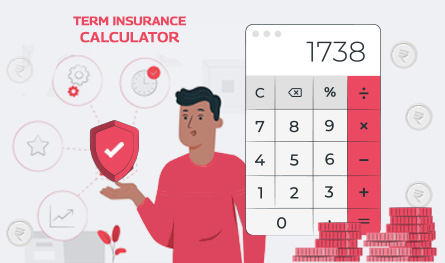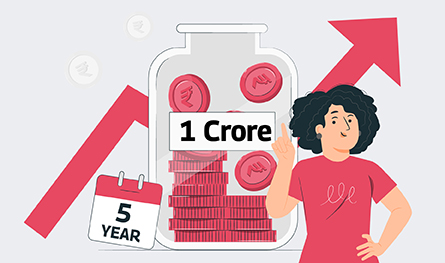Difference Between Monthly Income Plans MIPs and Systematic Investment Plans SIPs
.png)
To enjoy a financially secure life during your working years and throughout your retirement, you must invest in plans which allow you monetary independence. MIPs and SIPs are among some such plans to consider.
.png)
Investing consistently through mutual funds allows an investor to accumulate enough wealth for the future. Investing in Monthly Investment Plans (MIPs) or Systematic Investment Plans (SIPs) can get you financial freedom for life. Let us see the difference between MIPs and SIPs to choose the best plan as per your income and financial goals.
What is MIP or Monthly income plan?
A monthly income plan or MIP is a mutual fund that invests in equity and debt securities to generate cash flow and protect capital at the same time. MIPs are designed in a way so that you can have consistent income coming in from interest and dividends. Hence, MIP schemes appeal to retired individuals and elderly citizens who do not have many other ways of earning consistent monthly income.
However, you must note that, unlike its name, MIP may not allow guaranteed income monthly. When the market is strong, investors can expect a constant source of income. And during market fluctuations, they might experience a fall in terms of returns. So, the volatility in the market impacts the expected returns.
What is SIP or Systematic Investment Plan?
A systematic investment plan or SIP is another type of mutual fund investment. It is regarded as the easiest and most effective way to invest in the stock market. There are several types of SIPs that one can choose to invest in. SIP investments need the investor to make regular monthly contributions. These contributions are then further used to invest online in mutual fund schemes.
So, SIP is not a standalone investment instrument. Rather it is a way of accruing a corpus using regular and constant contributions. Hence, it is considered an effective way to invest if you are looking at long-term investment goals.
SIPs allow investors to put their money in various mutual fund schemes to accumulate a corpus for their future and earn through SIP interest rates. SIPs allow investors to spend meager amounts of money on a weekly or monthly basis as per the plan.
Investing Method – How to Invest in SIP?
The method of investing in SIPs is easy and hassle-free. Under SIPs, you need to keep aside a particular sum of money to be deducted from your account on a weekly, monthly, or fortnightly basis as per the plan.
Further, SIPs allow the investor to invest in several financial instruments like debts, equities, etc. as per the risk tolerance of the investor along with their financial goals. If you plan to invest in a SIP for a long duration, you are likely to receive superior returns.
Since SIPs allow the investor to invest a specific amount at regular intervals, it encourages the investor to develop the habit of saving.
Investment Methods for MIPs and SIPs
If you want to invest in a Mutual Fund scheme, the first thing to consider is how you want to invest in the fund. There are some options such as:
1. MIP:
Under MIPs, the investor makes a single lump sum investment of the total amount that the person wants to invest in. For example, if you want to invest INR 50,000 in a mutual fund by using the lump sum payment technique, you will have to submit the same amount at one go to start the investment.
2. SIP:
If you choose to invest in a SIP, you can start the investment process with a small amount. SIP can be started with a minimum investment amount of INR 500 to INR 1000. For example, if you want to invest in a SIP with INR 50,000 for 10 months, you can do so by investing INR 5000 each month for the next 10 months.
Difference Between Monthly Income Plans & Systematic Investment Plans
A systematic investment plan or SIP is a type of mutual fund investment where the investor is required to make regular monthly contributions.These contributions are then further used to invest in mutual fund schemes to gain maximum returns.
Here are some good SIP plans:
~ ICICI Prudential Equity and Debt Fund
~ Aditya Birla Sun Life Digital India Fund
~ ICICI Prudential Value Discovery Fund
~ Mahindra Manulife Multicap Badhat Yojana
~ Invesco India Gold Fund
Some of the popular SIPs are:
~ Whole Life Mid-Cap Equity Fund by Tata AIA Life Insurance
~ Growth Opportunities Plus Fund by Bharti AXA
~ Individual Pure Equity Fund by Aditya Birla Sun Life
~ Whole Life Aggressive Growth Fund by Tata AIA Life
Investments in Mutual Funds are possible in different ways including the SIP or Systematic Investment Plan method or the one-time investment method. Under the SIP method, you pay a regular sum of a particular amount for an extended period. On the other hand, in the case of a one-time investment, you pay a lump sum amount as a one-time payment for the same period. Use the SIP calculator online to check the returns you can earn.
The key difference between SIP and PMS is related to the minimum amount that can be invested in the fund. You can start a Mutual Fund SIP with a low fund amount of INR 100. However, in the case of PMS, you need to invest a minimum amount of INR 50 lakhs to start the plan.
Another difference between the two funds lies in the strategy of investment based on risk and return.
Getting a weekly SIP or systematic investment plan might lead to a lot of paperwork and an increased requirement to keep yourself updated with transaction tracks. Hence, you can avoid it by getting a monthly SIP to achieve ease of investment.
Yes, the SIP amount can be withdrawn anytime. But you must note some exceptions in the form of lock-in periods of some SIPs. For instance, ELSS comes with a lock-in period of three years and child fund plans have a lock-in period of 5 years etc.
SIP is a safe investment method when it comes to investing in mutual funds. SIP plans are regarded as a safe and convenient way to get your hands on India’s equity market via mutual funds. However, it is recommended to invest in mutual funds when the market conditions are not overrated.

Author Bio
Paybima Team
Paybima is an Indian insurance aggregator on a mission to make insurance simple for people. Paybima is the Digital arm of the already established and trusted Mahindra Insurance Brokers Ltd., a reputed name in the insurance broking industry with 17 years of experience. Paybima promises you the easy-to-access online platform to buy insurance policies, and also extend their unrelented assistance with all your policy related queries and services.
Other Life Insurance Products
Latest Post

Let’s be honest – life insurance planning isn’t exactly someone’s weekend hobby. It is the financial equivalent of flossing: we understand its importance, but we tend to put it off. But somewhere between balancing work and life, you might realise you need to have a solid plan in place – just in case.


If you think of life insurance, chances are you are picturing something people buy in their 30s or 40s. But what if you are 65 or older and just getting started? The good news is that you are never too late. Whether you are thinking of easing the financial burden on your family, covering final expenses, or simply leaving behind a legacy, there are life insurance options tailored just for you.
This article will be a guide to life insurance for senior citizens above 65 years, explaining why it is important, the type of insurance options, and how to get the right policy for you.


Health insurance plans are purchased with the hope of medical protection in times of need. However, sometimes it ends up being a source of surprise and disappointment. This mostly happens when people rush to buy health insurance plans, often overlooking essential aspects. Ignoring waiting period clauses, misunderstanding exclusions, and being unaware of sub-limits can lead to unwanted problems in the future.


If you are looking at investment policies offering INR 1 Crore in 5 years, we talk about some excellent plans in this post to help you choose the best one and reach your goal. However, it is important not to get swayed. Doing proper research and taking advice from financial or insurance advisors is important. Learn about such investment plan in this post.

The last few years have made it very clear that having health insurance is essential for everyone. Whether you are a young professional or a senior citizen, are single or have a family to support, health insurance cannot be ignored. Keeping this in mind, health insurance companies offer comprehensive plans that suit people with varied insurance needs.




